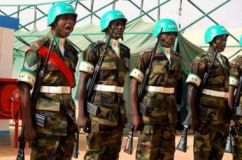International force rapidly needed to save Darfur – ICG
Mar 17, 2006 (NAIROBI/BRUSSELS) — The International Crisis Group (ICG) called in a new report published today to rapidly boost international forces in Sudan’s troubled Darfur region to halt the escalating proxy war between Sudan and Chad which will cost tens of thousands more lives and destabilise a wide swathe of Africa.
 To Save Darfur, the latest report from the ICG, examines the seriously deteriorating situation in western Sudan region and along the Chad-Sudan border, arguing that a highly capable and mobile UN-led force must be sent immediately to Darfur to stabilise the situation until a broader UN mission can take over in October.
To Save Darfur, the latest report from the ICG, examines the seriously deteriorating situation in western Sudan region and along the Chad-Sudan border, arguing that a highly capable and mobile UN-led force must be sent immediately to Darfur to stabilise the situation until a broader UN mission can take over in October.
“The small African Union Mission in Sudan (AMIS) has reached its military and political limits”, says John Prendergast, Crisis Group Senior Africa Adviser. “There’s just no way AMIS can give civilians the protection they need and prevent this war now escalating”.
Inside Darfur, humanitarian access is at its lowest in two years, civilians continue to bear the brunt of the violence, the ceasefire is in tatters and political talks are stalled. Fighting is most intense and civilians at greatest risk along the border with Chad and the Tawila-Graida corridor.
While the rebels are not helping contain the situation, the Sudanese government bears primary responsibility for its deterioration. It still uses offensive air power, supports militias and stokes inter-communal violence. Sudanese security elements are supporting the well-armed Chadian rebels in Western Darfur, while President Idris Deby in Chad scrambles to bolster his position by reaching out in turn to the Darfur rebels.
Earlier this month, the African Union extended the 7,000-strong mission in Darfur to 30 September, and accepted in principle a UN mission thereafter. But it failed to take the necessary timely and decisive action to strengthen the current operation’s civilian protection mandate or agree to more troops on the ground now, from Africa or anywhere else. The situation cries out for a new multinational force with a strong protection mandate, distinct from AMIS but working with it, to bridge the gap over the crucial next six months.
A militarily capable UN member state should offer to the Security Council to lead for this purpose a blue-helmet stabilisation force – consisting if possible of some 5,000 troops – to hold the line until a full UN mission is put together. France seems the most promising candidate, with troops and aircraft already in the area, but other states must help too.
At the same time, the AU, in close coordination with the UN, should continue to play a lead role in the effort to negotiate a real ceasefire and a political settlement in Abuja.
“A lasting solution to the Darfur conflict can only come with a three-part strategy, aimed at achieving physical security, an inclusive political agreement, and an end to impunity”, says Gareth Evans, President of Crisis Group. “But right now, to save Darfur, the most urgent need is to get some 5,000 UN troops on the ground and operational as quickly as possible”.
Full text of ICG’s report To Save Darfur is available at : http://www.crisisgroup.org/home/index.cfm?l=1&id=4027
(ICG/ST)
